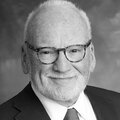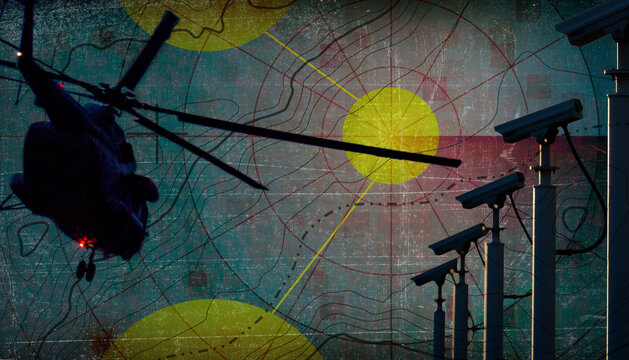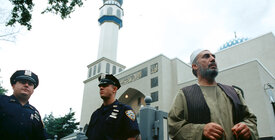
Replacing the Department of Homeland Security with Something Better
A mistake made in panic would be best fixed by starting over.

Part of
This essay is part of the Brennan Center’s series exploring new approaches to national security 20 years after 9/11.
Perhaps the most tangible and enduring result of the 9/11 attacks is a large, beleaguered, and ill-begotten bureaucracy, the U.S. Department of Homeland Security. Enough time has passed since its creation to realize that the department was poorly conceived, and it is not getting appreciably better with age. The issues surrounding domestic security are, however, increasing in importance and complexity, requiring a more effective organization.
Prior to 9/11, the Bush administration opposed congressional suggestions that the president play with the U.S. governmental organization chart to create a new “super department” focused on what some in Congress were beginning to call, in a slightly Orwellian phrase, “homeland security.” As a career officer and a holdover from the Clinton administration in the role of the White House’s national coordinator for security and counterterrorism, I thought that we should be focusing on action, not on reorganization.
Following the 9/11 attack, Bush finally started to take action against al Qaeda and continued to oppose big, structural bureaucratic changes. He looked to the two agencies that had failed to do enough to prevent the 9/11 attack, the FBI domestically and the CIA abroad. Neither was prepared for the task, especially the bureau.
The attorney general and FBI director had previously contemplated scaling back the small counterterrorism effort the bureau had mounted, which was being executed by a handful of agents in New York and Washington. In the scores of field offices, almost no one had been trained for the task. I joked at the time with one senior FBI leader that most of his agents probably thought “Al Kyda” might be the name of a Mafia don.
Consideration was given by the Bush team to an idea I supported: revamping the FBI by creating a new agency to deal with domestic security, what some called an “American MI-5,” after the nickname of the British Security Service. Bush, however, succumbed to then-FBI Director Robert Mueller’s pleas to give them “one more chance” to deal with the terrorism threat. It took years for the FBI to become a domestic security force capable of identifying and thwarting fundamentalist Islamic terrorism in the United States, and it did so by overstaffing the mission to the detriment of other domestic security and law enforcement tasks.
As far as the White House was concerned, therefore, the administration had made its decision about who would deal with domestic security. Congress had other ideas. Just as the Bush team had felt the need to do something dramatic after 9/11, invading Afghanistan and then Iraq, many in Congress were filled with a desire to take initiatives of their own. Members of both parties coalesced around the idea that the Bush administration had publicly rejected: the creation of a “super” cabinet department through the transfer and rearrangement of a vast array of existing federal agencies with diverse missions. Of the 17 agencies the congressional plan proposed to mash together in a new counterterrorism department, only one, the Transportation Security Administration, had counterterrorism as one of its primary missions.
Told that the massive reorganization plan would pass Congress, Bush dropped his opposition and claimed the idea as his own. But neither Congress nor Bush proposed to include in the new department the one agency that the president had already put in charge of domestic security, the FBI. Thus, from its first day, the new Homeland Security Department was at best a supporting actor in the counterterrorism mission for which it was created.
In the years that followed, it fumbled a response to Hurricane Katrina and irritated citizens at airports with “security theater.” Under President Trump, it exhibited a combination of incompetence and cruelty in dealing with immigration. Consistently rated poorly by congressional and outside assessments, the new department experienced low morale and difficulty in hiring highly qualified applicants. Some of the agencies forced to merge into DHS, notably the Secret Service and Coast Guard, began to lay the groundwork for secession from it. Making this bureaucratic Frankenstein an effective organization with good morale and public respect is beyond the capabilities of any leadership team.
Yet as the hapless Homeland Security Department approaches its 20th birthday, the need for an integrated domestic security service remains real. In addition to Islamist terrorism, the United States faces significant threats from white supremacists, cybercriminals, and espionage services of potentially hostile nation states. It would make sense to spin off a new department with that domestic security focus and no extraneous missions.
A more focused department — call it the Department of Public Safety — should be built around the FBI’s National Security Division, which has the lead today on counterterrorism, cybercrimes, and counterespionage. Those three missions would become the writ of the new department. From the current Homeland Security Department should come the cyber unit and the Secret Service (which chiefly does protective security). From the Office of the National Intelligence Director would come the National Counterterrorism Center. These four entities would form a coherent, mission-focused team.
The remaining units of today’s Department of Homeland Security could be recast to reflect their predominant missions — call it the Borders and Transportation Security department. The response agency for disasters, the Federal Emergency Management Agency, could return to its original independent status.
Giving these agencies a new start in manageably sized bureaucracies with focused missions, unburdened from past errors and reputation-damaging missteps, would create a more rational organizational structure with better chances of succeeding at their important tasks. Preserving the status quo will only perpetuate the mistakes made in the panicked trauma that followed 9/11 and doom these important missions to continued mishandling and lack of success.
Richard A. Clarke is CEO of Good Harbor Security Risk Management. He served 30 years in national security positions in the Defense Department, State Department, and White House, and he was the national crisis manager on 9/11.
More from the 9/11 at 20 series
-
It’s Time to Tear Up the Executive Branch’s Blank Check
Congress must reassert its constitutional authority on national security issues. -
Ending the ‘National Security’ Excuse for Racial and Religious Profiling
9/11 sparked a wrongheaded wave of using race, religion, or political views as indicators for terrorism. -
Rolling Back the Post-9/11 Surveillance State
Restoring key privacy protections will benefit both national security and civil liberties.




